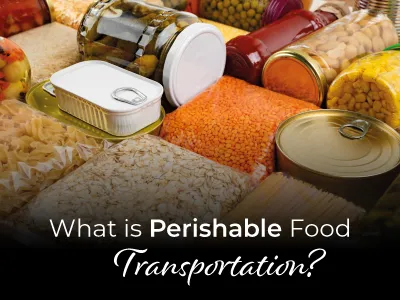
Perishable food transportation is one of the most curious topics in the transportation industry. In short, perishable food transportation protects and transports frozen food items. Transporting perishable products is crucial in ensuring food reaches the customer intact and fresh. For this reason, refrigerated trailers or reefer containers haul perishable foods. This includes fruit, vegetables, seafood, pharmaceutical products, baked goods, meat, and plants. Thanks to perishable food transportation, such products are preserved fresh and high-quality, even in remote areas, before reaching the final consumer. The "cool refrigerated" method mainly transports perishable food products. If appropriate storage and transportation conditions are not provided for the products, the products may deteriorate. Since the transportation of each food product is different, the temperature and heat values should be adjusted accordingly.
How Should Perishable Food Transportation Be Carried Out?
Of course, some critical issues should be considered during perishable food transportation. The most important of these is temperature control. In this type of transportation, temperature-controlled intermodal cargo containers are usually transported by sea. Considering cargo volumes and costs, this is the most preferred mode. Refrigerated reefer containers are insulated vehicles with temperature monitoring and data logging devices. The temperature in such containers can be set at desired levels to maintain product quality and increase product availability. This type of container is ideal for foods such as meat products, seafood, vegetables, and fruit. The temperature value depends on the type of cargo being transported and the manufacturer's requirements. While -30°C refrigerated containers are used for seafood and meat products, foodstuffs can also be transported in a +24°C environment after necessary cleaning for the same container.
What Should Be Considered in Cold Food Transportation?
Product reception areas, storage areas, product collection areas, and pre-cooling areas should be planned and organized to avoid problems regarding volume and layout. At this point, the proper information structure should be established, and data should be monitored simultaneously. Little attention is paid to the occupancy rates in the product pools, where the appropriate amount of food can be stored. For this reason, the curtains of the cold departments should be drawn in the evenings; the cold air blowing directions should be correct, and the degree of control of the store cold storage should be made according to the central system. The issues to be considered in cold food logistics are briefly as follows;
- The transport vehicle must be suitable for cold food transportation.
- When necessary, products taken from the warehouse must be loaded back onto the refrigerated transport vehicle.
- Products must be loaded from production to the vehicle at the required temperature.
- The delivery of the products from the vehicle to the companies that will sell the product must be done correctly.
- When transferring products from the enterprise to the consumer, they must be ensured at the correct temperature.
Products that need cold food logistics are generally heat-sensitive products. Therefore, undesirable results may occur if the necessary temperature conditions are not provided. Looking at the history of cold food logistics, it is seen that it was used primarily for the supply of medicines and food preservation during the 'World War II period. Cold chain logistics, generally used in Western cultures, is now quite common in our country. In this context, support should be obtained from experienced companies to ensure communication and coordination of cold chain supply. In this context, you can contact Ünsped Global Logistics, where you can get support for all kinds of transportation. You can also get consultancy services from Ünsped Customs Consultancy for your necessary customs procedures.
 Back
Back







